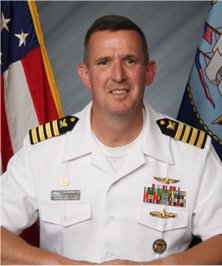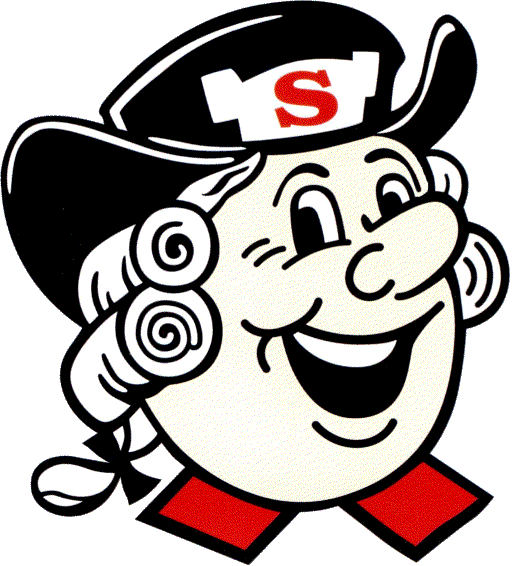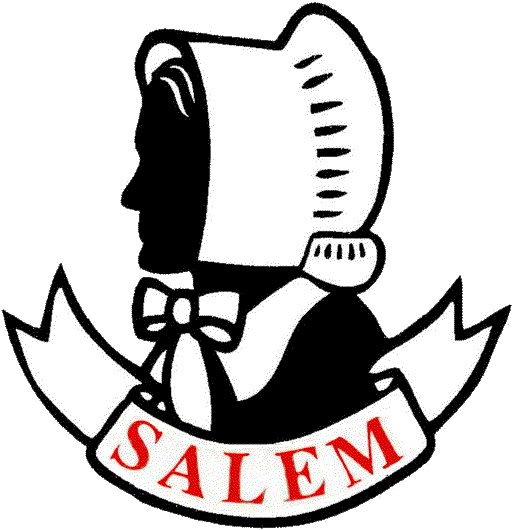 U.S. Navy Captain Tim Harrington, an active duty naval officer, has received the Salem High School Alumni Association 2013 Honored Alumnus Award. Captain Harrington is a 1984 Salem High School graduate, who currently serves as the Deputy Chief of Staff for Logistics, Fleet Supply and Ordnance for the Commander, United States Pacific Fleet in Pearl Harbor, Hawaii.
U.S. Navy Captain Tim Harrington, an active duty naval officer, has received the Salem High School Alumni Association 2013 Honored Alumnus Award. Captain Harrington is a 1984 Salem High School graduate, who currently serves as the Deputy Chief of Staff for Logistics, Fleet Supply and Ordnance for the Commander, United States Pacific Fleet in Pearl Harbor, Hawaii.
Shelley Miller Wilson, second vice president of the Salem High School Alumni Association, explained that the alumni relations committee chose Harrington because of his dedication and service to our country. "His accomplishments are impressive, and his hard work and dedication are things we could not overlook. He is willing to give back to his country, and for this we are grateful," she said. Harrington said he is "truly humbled" to join the association's roster of honored alumni.
Captain Harrington's duties as the deputy to the senior Naval Logistician and Staff in the Pacific Theater, are to train and equip operational forces. He plans, coordinates, integrates, and synchronizes logistics and sustainment efforts, and assures expeditionary war fighting readiness for Naval, Joint, Combined, and Coalition operations in the Pacific Fleet’s theater of operations.
Additionally, Harrington provides oversight to the coordinated end-to-end supply chain management of ordnance, repair parts, and other items for U.S. Navy sailors aboard ships and naval forces in the vast region from the U.S. West Coast to the entrance to the Persian Gulf.
“There are a lot of moving parts and a lot of things that break,” Harrington said of the repair parts for ships and associated aircraft that must be maintained at sea.
His previous assignments included two years serving on the 40-member personal staff for General John Shalikashvili when he was chairman of the Joint Chiefs of Staff in the mid-1990s.
Harrington's sea duties have included serving as the disbursing and ward room officer on the aircraft carrier USS Forrestal; supply officer on the frigate USS Reid during Operation Desert Storm; readiness officer on the aircraft carrier USS Abraham Lincoln; and supply officer on the aircraft carriers USS Kitty Hawk and USS George Washington, both forward deployed in Japan.
Harrington's awards include the Legion of Merit, the Defense of Meritorious Service Medal, the Meritorious Service Medal (3 awards), the Navy and Marine Corps Commendation Medal (8 awards), and the Navy and Marine Corps Achievement Medal. He also has multiple unit and service awards.
Captain Harrington credits his family's support, particularly during deployments, with his success in the navy. He and his wife, Laura Newton Harrington, a 1987 SHS graduate, have two children: Tyler, 16, and MacKenzie, 12. His parents, Paul and Carolyn Harrington, 1953 SHS graduates, and his three siblings—Barb, Julie, and Jim—all reside with their families in the Chicago metropolitan area.
Harrington said he believes the toughest part for anyone serving in the military is the time he or she is away along with the sacrifices family members make while their spouse, son, or daughter is away. Every sailor depends on the support of relatives, he explained during a telephone interview from his office in Hawaii. "Those are the unsung heroes of the military—the people back home," he said.
Harrington joined the navy after earning his bachelor's degree in business administration from Youngstown State University and working briefly in the Chicago office of a national brokerage firm. The leader of the office was a navy veteran who encouraged Harrington's interest in the navy as a way to see the world.
Harrington took an exam for admission to the U.S. Navy Officer Candidate School in Newport, Rhode Island. He gained his commission there in 1989. His other academic credentials include a master's degree in business administration from the University of Georgia and completion of the Advanced Management Program at Duke University’s Fuqua School of Business.
Harrington chose to stay in the navy after the USS Reid intercepted and eventually took control of a ship that was "trying to smuggle things." That experience impressed him with the importance of the navy's maritime security mission. "I don't want to be corny about it, but you do it for love of country. You do it really so people can rest easy at night because they know we are out there," he said.
While his experiences at Salem High School did not directly lead to his decision to join the navy, Harrington said several SHS teachers "laid the groundwork" for his naval career.
He particularly remembers German teacher Traudi Reed, eighth grade science teacher and football coach Bill Miller, and high school basketball coaches, Jerry Allen, George Spack, and Jim Shivers. "They gave me that spark," he said.
The basketball coaches "taught me about loyalty. They taught me about confidence, and they taught me about self-control. They probably all thought that I was quite a challenge," he said, laughing. Even if it did not seem as though he mastered their lessons as a teen, Harrington said he has applied them in combination with UCLA Coach John Wooden's "Pyramid of Success" philosophy to the teamwork approach he has strived to develop among his navy colleagues.
Transcript of U.S. Navy Captain Tim Harrington's Speech: May 25, 2013
Dr. Yerkey, thank you so much for those kind words; I can’t tell you how much I appreciate that.
If we could, can we give one more round of applause for the deserving seniors here tonight and for all the seniors of the class of 2013 that will graduate here very soon?
Seniors, how about a round of applause to your family and friends that are here tonight that have supported you over the years?
Dr. Yerkey, Dr. Apicella, Shelley Wilson, distinguished guests, family, and friends, thank you so much for this opportunity. I am truly humbled and honored by this. Thank you so much.
There are a few family and friends I would like to recognize:
First, my wife, Laura, and my son, Tyler and daughter, MacKenzie. My Mom and Dad, Paul and Carolyn Harrington, my mother-in-law, Charlene Hunchuck, her mom, Ms. Shirley Petti, my brother, Jim, and my sister Julie. My sister, Barb, could not be here. As I told Madeline Patton Shivers when she called me a few months ago about this unbelievably humbling honor, the sacrifice of any military service member is many times overshadowed by the sacrifices of the families we leave back home. So thank you all for being here.
Status of the U.S. Navy
I am blessed to be able to speak for a few minutes tonight about why I’m up here. But I would also like to take this opportunity to provide you, as a naval officer working for the commander of the Pacific Fleet in Pearl Harbor, Hawaii, a current operating status of our forces:
We currently have almost 320,000 officers and enlisted sailors, and 110,000 reservists in the U.S. Navy.
We have 95 ships deployed or nearly 35% of our fleet. Approximately 45 ships are underway for local training or about 15% of the fleet.
Most people ask, "Where are the aircraft carriers?" And having served on board four of our mighty aircraft carriers, I can tell you we have six of our 11 carriers underway right now patrolling waters all over the globe with over 400-plus aircraft deployed onboard.
The U.S. Navy knows that "being there matters." And I can assure you that every Saturday, Sunday, and holiday this year, the navy will be on station around the globe ready to defend this great nation at all times, ensuring global free trade, and on station when any disasters strike.
Crucible Moments
I want to speak to you for a few minutes this evening (and in some ways this was difficult to consolidate, and in other ways it was very easy), about why in the world am I standing up here!
First and foremost, I am here because of my wonderful family: my wife Laura and our kids, Tyler and MacKenzie, who have always been there for me. My Mom and Dad and brother Jim and sisters Barb and Julie, who raised me and taught me great values. And this great community. I was blessed to grow up in the best town and attend a great school system, from Southeast Elementary to this great school we're in tonight.
I’m a Logistics Officer in the U.S. Navy. I do a variety of things including figuring out what spare parts go on our ships (and in the case of an aircraft carrier, it is tens of thousands of items worth tens of millions of dollars), to managing ordnance (bombs, missiles), to managing the replenishment of our ships from the sea with fuel, food and parts that can keep us at sea indefinitely if we choose (trust me, I’ve spent three months straight at sea and it’s an interesting experience!), and we also do a lot of inventorying of all this stuff. But one thing I have found value in is taking a personal inventory of myself.
So I am also here because of living through, working through, reflecting on, learning from and adjusting to some crucible moments. These events changed me, helped me, and hopefully made me a better father, husband, son, brother, naval officer, leader, and friend. I started thinking about this and reflecting on the concept of taking a personal inventory several years ago, and I find it really has helped me grow.
What do I mean by crucible moments? I ask you all to cross your arms. Get comfortable. Everyone comfortable? Now, cross them the other way. Is that comfortable, or does it feel a little strange? Every time I do this it feels a little strange. What I do in the navy is the first arm cross, and, for example, standing up here right now is the second, slightly uncomfortable arm cross!For you seniors out there, being a student here is probably the first arm cross, and what you are about to do after graduation is probably the uncomfortable second arm cross. Keep in mind, this is nothing you can’t do, but it is slightly uncomfortable.
Crucible moments, to me, are events with people in your life that, after reflection, you learn from and adjust yourself to keep getting better. Sometimes you don’t figure them out for years, other times they are right there. Sometimes crucible moments make you feel great, sometimes they feel awkward, like the arm crossing we did.
Some crucible moments are bad, and some are good. Sometimes they are initially good and upon reflection and the passage of years, they turn out not to be so good and vice versa. Sometimes they are simple events. Other crucible moments are quite complicated.
I think everyone should take time every year to think about their crucible moments. Jot them down, and ask yourself: "Did I adjust? Did I need to adjust? Am I constantly improving?”
Early Crucible Moments
From my personal inventory I identified the following crucible moments:
The foundation I got simply growing up in this town.
Dad telling me, "You don't quit something you start" in seventh grade football.
Mom continuing family traditions, like baking rolls every Christmas Eve.
Coach Bill Miller taking me aside in the hallway at the Junior High School after I received a C in his class and telling me to have confidence in myself and that I was better than a C; I was an A.
Ninth Grade Basketball Coach Jim Shivers mentoring me throughout high school about being persistent and pursuing my basketball goals.
Basketball Coach Jerry Allen telling me to work hard, be aggressive, never give up.
Basketball Coach George Spack demonstrating self-control and discipline to show us how to master the basics of basketball. As I told Madeline Patton Shivers when she interviewed for the alumni association's press release, Coach Spack probably thought this was a pretty difficult task! Coach, sorry it took me 30 years to say thank you.
Mrs. Reed, my German teacher, having confidence in me and letting me be her German aide my senior year.
Todd Olson and Fritz Schlueter telling me about the United States Naval Academy when they were home during the summer breaks gave me the curiosity and spark to join the military.
I learned perseverance along with my good friend Mike Madison as we went out, I don’t know how many days a week, and played two-on-two with Brad Jones and Chuck Noll. We got beat so many times I couldn’t tell you, but we might see if we can round them up sometime and give it another shot. Dr. Madison, Mike tells me the hoop is still available down at your house on Highland Avenue!
My good friends in high school and the bond that was developed. Some of them are here tonight: Rich Herron, Tom Patterson, Fritz Schlueter, Lori Schlueter, and Mike Madison.
Dr. Peter Apicella and my brother Jim while in high school making a Rubik’s cube solution and marketing it nationwide showed me the innovative spirit.
Mark Shivers picking me up every morning to go to work at the Ohio Department of Transportation in Lisbon. After watching him play basketball and knowing him only from the court, he showed me how to be respectful, polite, and a gentlemen off the court.
Later Crucible Moments
Later crucible moments include
- Joining the navy and deploying for seven months for Desert Storm on an aircraft carrier. Dr. Yerkey can attest to that: He sat on a replenishment of $4 million on a C-130 cargo aircraft that we met briefly in Antalya, Turkey! That’s a whole other story though!
- Being thrust into a REAL job supervising 30 sailors and being accountable for $20 million dollars in cash for the ship.
- Reconnecting with Laura at the wedding of my good friend Dr. Eric Grieb (He was my neighbor on Oak Street and took my paper route over for me). Re-meeting Laura, also a Salem graduate, and eventually getting married to her has taught me that love is the most powerful 4 letter word. Thanks, Laura.
- Going on deployment on a guided missile frigate and conducting maritime interdiction operations in the Persian Gulf and seeing the maritime power of the United States Navy.
- Having the opportunity to be on the personal staff, work for, and learn from the Chairman of the Joint Chiefs of Staff, General Shalikashvili. He taught me poise and how not to let things get to you whether they are good or bad.
- My children being born and the unbelievable responsibility of becoming a father.
- Living outside the Continental United States in Iceland, Japan, and now Hawaii taught me respect for other cultures.
- Testifying in front of a Senate commission.
These are some crucible moments that I’ve reflected on that are obviously good moments and I reflect on them several times a year to stay focused, to make sure I’m living up to the life lesson I received from each event. I’ve continued to learn from them and for that I am always grateful.
But like crossing your arms the other way, there are crucible moments that, upon reflection, I simply just wanted to forget about. To the seniors here tonight I tell you: the unpleasant crucible moments won’t just go away. But you have the opportunity to live through them, work through them, reflect on them, learn from them, and hopefully make yourself better from them.
It’s like driving a car. Sometimes it’s a long, boring ride, sometimes it’s really heavy traffic and intense, sometimes you are relaxed and just able to listen to your favorite music, and sometimes you might even be in a wreck. My crucible moments that were wrecks include
- My grandparents passing away.
- College. This is a perfect example of an event being good at the time but upon reflection, was probably a time I could have done things better. I did learn from them though.
- Separation from my new wife for six months before the internet and cell phones. We actually had to write letters, and Laura did not know where I was or whether I was OK.
- The death of my best friend in the navy, Steve Carver.
- My son being born with complications and being in intensive care for three days.
- Not being present for the birth of my daughter because I was deployed on an aircraft carrier in the Persian Gulf and knowing my wife was home doing everything by herself.
- The tyranny of distance from my extended family while assigned to live in Iceland, Japan, and Hawaii.
- Not staying in touch with my good friends from high school. I added this to my list just the other day and am now adjusting myself and promising them that I will stay in touch with them and not go years in between talking with them. Just sending a Christmas card won't do either.
There are five other ones that are family in nature that I’ll keep to myself.
The list goes on, and it will continue to go on for me and for you. Many of my crucible moments stem from right here, from Salem, Ohio, this wonderful town. My challenge has always been the choice given to me to learn from these moments or not. I tell you that I’ve tried very hard to learn from them and move forward.
Can you make a commitment to keep getting better … to make every day your masterpiece? To take the little things and understand that they can make big things happen?
This has been my challenge. It is a challenge that has been made through the teachings of many other people and events. I have used John Wooden’s Pyramid of Success to guide me. Wooden, longtime basketball coach at the University of California Los Angeles, was a man of faith, a man of God, the wizard of Westwood. He led his teams to 10 NCAA Championships in 12 years, 88 consecutive wins, 4 undefeated seasons. Google his Pyramid of Success. I think you’ll like it. I have used it for myself personally and have used it to lead sailors, to command an organization, to become a better father, a better leader, a better son, a better brother, and a better friend.
I will stop, but leave you with this: Over the course of our lives we have the opportunity to identify and reflect and use crucible moments to make our lives better.
One quote that has stayed with me for a long time is from Theodore Roosevelt:
"Far better it is to dare mighty things, to win glorious triumphs even though checkered by failure, than to rank with those poor spirits who neither enjoy nor suffer much because they live in the gray twilight that knows neither victory nor defeat."
Remember the victories, understand and learn from them. Evaluate the defeats, and again understand and learn from them. Don’t live in the grey twilight. I’ve been there, and none of my crucible moments have been from that place.
So, why am I up here? I tell you, it’s because of all of you. It is because of this wonderful town, Salem's wonderful people, and the foundation that has been provided to me from being blessed to grow up here.
Thank you so much. Congratulations again to these well deserving young men and women and all those who laid their foundations for them to become our future leaders.


